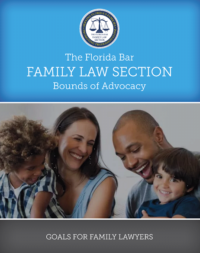Last year, during my term last year as Chair of The Florida Bar Family Law Section, the section published an updated version of the Bounds of Advocacy, a guide for Florida lawyers on the professional and ethical dilemmas that are unique to the practice of family law. The Bounds of Advocacy draws on the sources that create our rules of professional conduct and views those rules through a family law perspective. It suggests a higher level of practice than the minimum baseline of conduct required by Florida Bar rules and spells out guidelines for situations that often arise in family law matters where the rules do not provide sufficient guidance.
The American Academy of Matrimonial Lawyers published the original Bounds of Advocacy in 1991 and revised it in 2002. In the same year, the Florida Bar Family Law Section formed a committee to adapt the guide to Florida law and practice, and the section published its original version of the Bounds of Advocacy Goals for Family Lawyers in Florida in 2004. The 2018 version is the first revision and update to the 2004 Florida publication.
Family Law Section Ad Hoc Bounds of Advocacy Committee
Richard West, co-chair, Orlando Melinda Gamot, co-chair, Palm Beach Gardens Hon. Scott Bernstein, Miami Dr. Deborah Day, Winter Park Maria C. Gonzalez, Ft. Lauderdale Ky Koch, Clearwater David Manz, Marathon Hon. Ray McNeal, Ocala Ashley Myers, JacksonvilleI was honored that family law practitioners Richard West and Melinda Gamot accepted appointments to co-chair the Ad Hoc Bounds of Advocacy Committee as both were involved in the 2004 publication. Both are Florida Bar board certified in marital and family law and are fellows of the American Academy of Matrimonial Lawyers and the International Academy of Family Lawyers. They, along with other experienced family law attorneys from throughout the state, current and retired judiciary members, and even a mental health expert, worked tirelessly to ensure the quality of the republished version.
The importance of the update of the Bounds is highlighted by the public’s continued negative perception of our legal system and lawyers. The Florida Supreme Court and our bar have actively worked to improve public perception and lawyer behavior by promoting professionalism in the practice of law. In a 2013 opinion, the Florida Supreme Court enacted the code for resolving professionalism complaints and within the opinion, the Court made it clear that Florida Bar members shall not engage in unprofessional conduct, which they defined as substantial or repeated violations of the:
- Oath of Admission to the Florida Bar – Link here
- Florida Bar Creed of Professionalism – Link here
- Florida Bar Professionalism Expectations – Link here
- The Rules Regulating the Florida Bar – Link here
- Opinions of the Florida Supreme Court – Link here

Section 1: Professional Cooperation and the Administration of Justice – This section emphasizes a family law attorney’s role as not only an advocate but as a counselor and an officer of the court. It demonstrates that we, as professionals, must not simply advocate for our clients, but that we must manage emotions, problem-solve, and assist in doing our part to ensure the effectiveness of our judicial system.
Section 2: Competence and Advice – This section addresses that not only must we, of course, provide competent representation, but as part of our representation, we must advise clients of the impact of changing the family structure, the impact of conflict on the family, especially children, and we must advise clients of methods for resolving conflict and of alternatives to litigation.
Section 3: Client Relationship and Decision Making – This section recognizes that attorneys involved in a family law case, like every attorney, have obligations to their clients regarding diligence and communication. However, it reflects that these types of issues take on additional importance in family law cases where emotions run high and clients are sometimes unable to approach matters with the rationality needed to render appropriate decisions.
Section 4: Conflicts of Interest – This section highlights those situations within a family law matter where conflicts of interest often appear.
Section 5: Fees – This section establishes best practices and clear boundaries relating to attorney fees in family law cases.
Section 6: Children – Finally, this section addresses the family law lawyer’s unique role as it relates to children. It emphasizes, consistent with our obligations to our client, our role as a counselor who advises his or her client of the impact of contemplated actions on the children. It also highlights some of those areas where children’s interests are directly addressed within our law.
Richard West and Melinda Gamot shared their thoughts about the importance of the Bounds to the practice of family law. Their quotes were published in the May 15, 2018, issue of The Florida Bar News.
We hope family lawyers will use the Bounds to better serve our clients, our system of justice, and our individual practices by reducing the emotional and financial costs of family law conflicts, said West. Adopting the spirit of the Bounds will lead to increased cooperation while eliminating many of the negative aspects of restructuring a family. The committee is proud to present our vision to the family law bar.
The Bounds is a tool for the family lawyer to increase the level of professionalism and civility in an area of law fraught with human emotions, said Gamot. We strive to raise the level of positive behaviors for the lawyers and their clients.
In closing, the Bounds presents helpful assistance to anyone handling a family matter. Although all Family Law Section members should have received a hard copy of the publication in June of 2018, an electronic version of the publication is available on the Family Law Section’s website for anyone to download. Click on this link for your free copy.
By Nicole L. Goetz, P.L., Naples (Website)



 Craig Fabrikant, PhD
Craig Fabrikant, PhD
 We are pleased to announce that the proceeds from the FLAFCC 2018 14
We are pleased to announce that the proceeds from the FLAFCC 2018 14